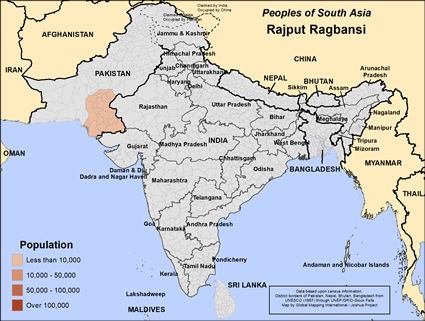Starting in the 5th century, there was a massive attack by the White Huns in what is now northern and northwestern India and Pakistan. About a century later the reigning Hindu-based Gupta Empire broke up, leaving the Subcontinent vulnerable to Muslim invaders from the north. As time went on, invaders took over land and integrated with the settled peoples of this region. Tribal leaders, especially those involved with defense, were accepted as Kshatrya, the second highest varna (major type of castes) in Hindu society, while their followers became the fourth and lowest varna. Priests became the Brahmins, the highest of the four varnas.
The Rajputs, who were part of the Kshatrya varna, became politically important in the seventh century. From around 800CE Rajput dynasties ruled northern India. Petty Rajput kingdoms were the main obstacle for Muslim domination of the Hindu subcontinent. For more than 500 years Rajputs were the warriors who defended kingdoms from invaders and conquered others. When possible, Rajputs settled down, became nobles, and enjoyed the lives of landed gentry.
Over a period of a couple hundred years, invaders penetrated the Rajput wall that protected the Subcontinent. Some Rajput subgroups converted to Islam during this time. The British Raj took over the Islamic Moghul Empire in South Asia. During their rule, which ended in 1947, the British recruited Rajputs into their military units. By the 1930s the Indian census stopped noting that someone is Rajput, so Rajput lineage has been less clear ever since. The Rajputs have kept alive their proud history of conquest, bravery and military might.
Pakistan has Rajput clans, mostly in Punjab Province.
Though many Rajputs are still in the armed forces or own land, many have moved on to other livelihoods. Some Rajputs now own impressive hotels in Rajasthan where tourists can be introduced to their history and culture. Rajputs who aren't so fortunate work as small businessmen or wage laborers.
They try to marry their daughters into clans of higher rank than their own. The Rajput clans in Rajasthan have the highest status, so families want their daughters to marry men from that state. Unfortunately, Rajputs often marry their daughters off while they are very young.
Though all Rajputs were once Hindu, some converted to Islam starting in the early 12th century. Sufi Muslim missionaries were instrumental in winning these Hindus to Islam, though others converted to Islam for political reasons. Conversion to Islam continued into the 19th century when the British were gaining power in the Subcontinent. It is important to note that conversions happen at the group level; entire Rajput clans converted to Islam, not individuals. Those who want to see Rajputs won to Jesus Christ should remember this.
Rajputs who have embraced Islam usually retain common social practices such as having their wives secluded (purdah). Those who are devout do their five daily ritual prayers, give alms to the poor, and go on the pilgrimage (haj) to Mecca, Saudi Arabia. Muslims from all communities come together on Friday afternoons to pray and hear a sermon at local mosques.
Ragbansi Rajputs are going through an identity crisis. Believers with the right skills can help them during this time of transition.
Pray for the Muslim Ragbansi Rajput community to increasingly grow in awareness of Jesus and their need for Him.
Pray the Lord will give Ragbansi Rajputs a spiritual hunger, then satisfy that hunger.
Pray that these Rajputs will understand the value of becoming part of God's royal family.
Pray for a Holy Spirit led humility for all Rajput communities to fall at the feet of the King of kings.
Pray for a disciple making movement among every Rajput community.
Scripture Prayers for the Rajput Ragbansi in Pakistan.
https://joshuaproject.net/people_groups/20275/PK
https://joshuaproject.net/people_groups/20424/IN
https://joshuaproject.net/index.php/people_groups/17928/IN
http://induhistory.blogspot.com/p/rajput-history.html
https://www.britannica.com/topic/Rajput
https://en.wikipedia.org/wiki/Rajput
| Profile Source: Keith Carey |











